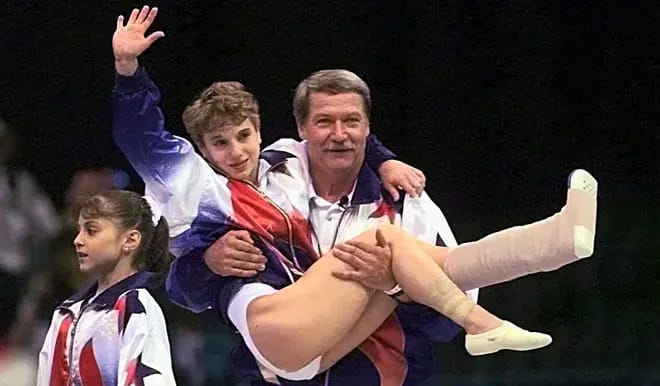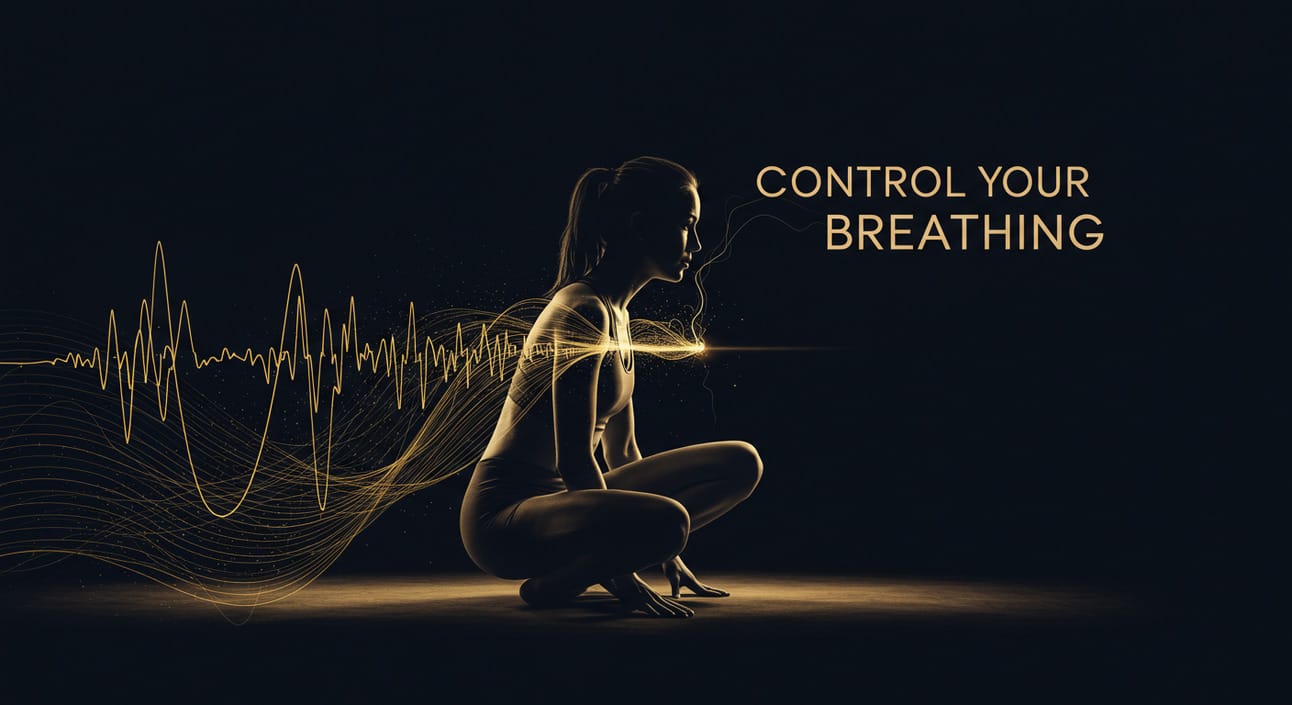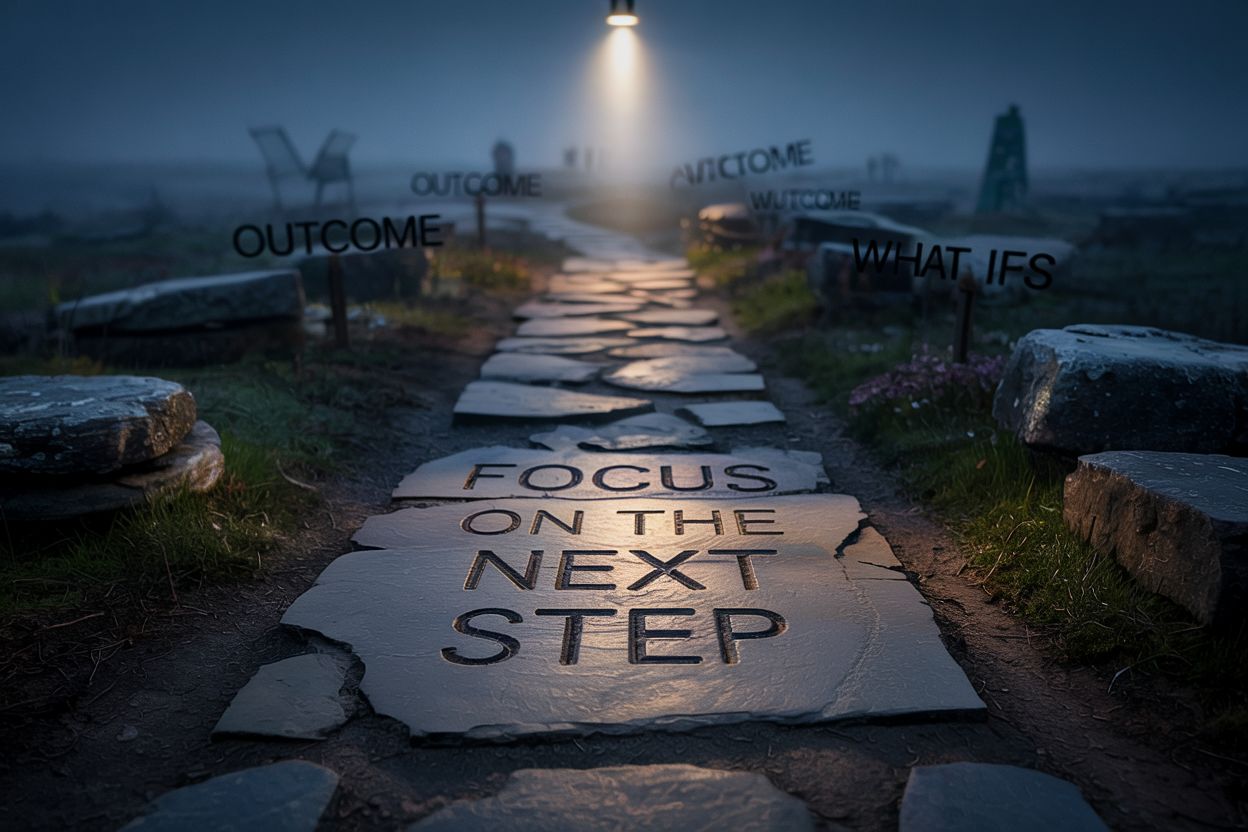This Week’s Theme : Composure
Your name is Kerri Strug. You are an elite gymnast competing for the United States at the 1996 Summer Olympics in Atlanta, Georgia. If there was ever a time for you to become a legend, it is this moment you’ve trained your entire life for.
You begin your approach to the vault, wind passing your ears as you gain momentum. Off the springboard you go, hurling into the air as your body contorts at breakneck speeds. As you spot the landing on a rotation, you calibrate your body and mind for the descent and plant.
As you land, your ankle pops and the pain signals from your brain kick into the highest gear possible - aka “Oh %$#!” mode. You’ve just torn two ligaments in front of billions of people watching. And by the way, you still have another vault to go in order to try to secure a gold medal for your country. What do you do?

Photo Cred : Brian Porco / USA Today
Mind Over Matter
From personal experience, I can tell you the human body is extremely complex. The ability it has to adapt, recover, and perform has impressed doctors for centuries.
Now, what if I told you the body isn’t our most powerful asset? It’s actually your mind. Humans have been around for quite some time and we still don’t truly understand how we can all have the same physical brain, but varying levels of commitment, desire, and drive.
Here are some of my favorite examples of athletes keeping their cool under duress:
Michael Jordan : “Flu Game” - that’s it. That’s the tweet.
Elena Delle Donne : Competed with a herniated disc in the WNBA finals.
Kobe Bryant : Stayed on the floor to shoot free throws after tearing Achilles.
Simone Biles : Won a gold medal with a calf injury in the 2024 Olympics.
Byron Leftwich : Broke leg and continued to play with help from teammates.
Moral of the story : “If you don’t mind, it don’t matter.” Pain receptors are in the brain and you actually have more control over them than you think. It’s all about establishing a process that gives you control and the ability to remain composed in chaos.

Sponsor Spotlight: Infraway
Speaking of pain, I’d like to introduce you all to this week’s sponsor, Infraway. Traditional heating pads often have just low/medium/high settings. In contrast, Infraway's new L1 unit lets you precisely adjust both your temperature and time down to the degree and minute.
The L1 heating pad wrap is designed with 4-way stretch, antimicrobial fabric embedded with Far Infrared (FIR) emitting bioceramic materials. This ensures 360-degree FIR coverage, offering a comfortable, flexible fit.
To get you going, The Infraway App, available on both Apple and Android platforms, gives you full control over the L1 via Bluetooth.

Your Weekly ‘Key 3’
So, how did Kerri Strug take that second vault? How did Jordan dominate with the flu?
How did Kobe sink free throws on a torn Achilles? It wasn't magic. It was mental mastery.
As we saw, the mind drives the action. Composure comes from process, not chance.
It’s a skill built on intentional control. Let's break down the toolkit you can build.
Key 1: Control Your Breathing (The Physiological Anchor)
When pressure hits, what’s the first thing to go? Usually, conscious control of your breath. Shallow, rapid breathing signals stress. It floods your system with cortisol.
Deep, controlled breathing signals calm. It activates your body’s relaxation response. This is your fastest route to physiological control. Elite athletes know this instinctively.
Think free throw shooters finding their rhythm. Snipers steadying their aim before the shot. They deliberately use breath to center themselves. To calm nerves and enhance focus.
You can leverage this same tool. Before a big presentation? Control your breath. During a tense negotiation? Control your breath. Feeling overwhelmed by deadlines? Same answer.
Actionable Technique: Box Breathing - It’s simple: Inhale slowly for 4 seconds.
Hold that breath gently for 4 seconds. Exhale slowly and completely for 4 seconds. Hold the exhale gently for 4 seconds. Repeat the cycle for a minute or two.
This regulates your nervous system. Practice it daily, not just in crises. Make conscious breathing your anchor. It’s step one in maintaining composure.

Key 2: Control Your Focus (The Attentional Anchor)
With your body calmer, where does your mind go? Composure demands controlling your attention. It means directing focus intentionally. Not letting distractions hijack your mind.
Think again about that free-throw shooter. They block out the screaming crowd (external noise). They ignore the pressure, the score (internal noise). Their focus narrows to only the routine, the rim.
That’s attentional control in action. How do you apply this off the court? When facing a high-stakes task or conversation? Focus on the process, not just the outcome.
What is the immediate next step you control? Focus only on executing that step well. Don't let your mind race ahead to "what ifs." Don't dwell on past mistakes in the moment.
Actionable Technique: Identify Controllables - In any situation, what can you actually control? Usually, it’s your preparation, your effort, your actions, your responses. You likely can't control the outcome directly, or how other people react.
Pour your mental energy ONLY into your controllables. Let go of the rest. This sharpens focus. Acknowledge distractions (internal or external). Then deliberately redirect your focus back.
This mental "reset" is a focusing skill. Practice it during deep work or daily tasks. Control your focus; control your performance.

Key 3: Control Your Narrative (The Cognitive Anchor)
Your breath is calm, your focus is sharp. Now, what story are you telling yourself? The narrative in your head dictates your emotional state. It shapes how you perceive and react to events.
Composure hinges on managing this internal story. Athletes are masters (and victims) of this. One player misses a shot and spirals, thinking "I'm awful." Another misses, thinks "Okay, reset stance, next shot." For me, I always knew I had another shot attempt coming and I’d make that one.
The event is the same; the narrative changes everything. It’s about constructive versus destructive self-talk. How does this apply to your professional life? You receive critical feedback. What's the story?
"My boss hates me, I'm failing"? (Destructive) Or: "This is tough feedback, but it's data. What can I learn?" (Constructive) A project hits a snag. Is the narrative: "This is a disaster, we're doomed"? Or: "Okay, unexpected challenge. How do we pivot? What's step one?" You choose the narrative.
Actionable Technique: Reframe Setbacks - Consciously look for the learning or opportunity. Turn "problems" into "puzzles to solve."
Think internally : "I've prepared." "I can handle this next step." or "This is difficult, but I have the resources." Focus your narrative on your agency – what you can do. Control the story, control your response.

Post-Game Recap : “Composure” is your trainable superpower
These three keys – Breathing, Focus, Narrative – are the core of the composure toolkit. They aren't magic; they are trainable skills that you, too, can have like your athlete counterparts.
Remember our friend, Kerri? While I haven’t spoken to her personally (yet), I’m sure these keys were in play. For those of you who need closure to the story…she returned to the vault, battered ankle and all, and landed a score of 9.712 - which won the Americans a gold medal.
How You Can ‘Assist’ The Eversley Edge
Hope these insights from the Composure Toolkit help you stay calm, think clearly, and perform strong when things heat up! Mastering your inner game is key to gaining your edge.
If you found this week's newsletter valuable, the best way to support The Eversley Edge is to share it. Forwarding this email or sharing the subscription link with a colleague, friend, or connection who could also benefit helps this community grow.
And if you have any other feedback on this week's newsletter, feel free to hit reply – I read every response and appreciate you sharing your perspective. Thanks for being part of this growing community!

